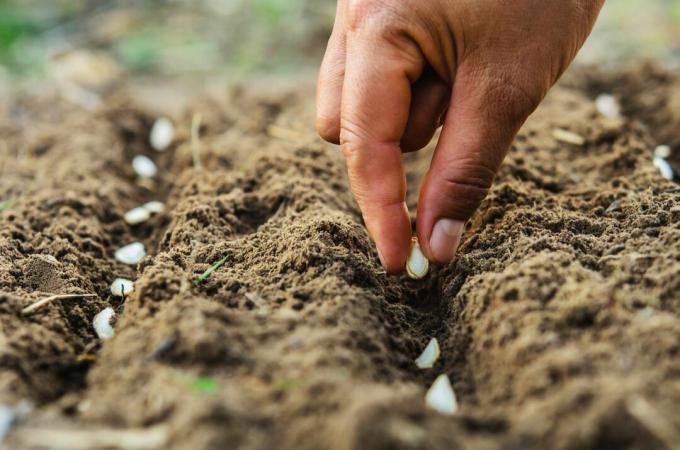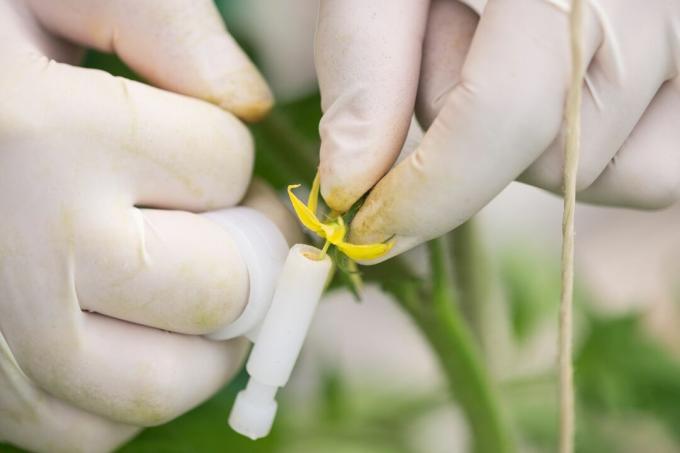The criticism of hybrid seeds is getting louder, but are the prejudices also justified? We'll get to the bottom of the matter for you.

Hybrid seeds are an integral part of agriculture these days. With a few exceptions, for example, all sugar beet and maize fields in Germany are included Hybrid varieties are ordered and they are also diversified in the production of vegetable and ornamental plants utilized. Not only in industrialized countries like Germany, but also in less developed countries like India, more and more farmers are preferring the expensive hybrid seeds. That is why the question arises for many: What are hybrid varieties and which seeds are right for the hobby gardener?
What is hybrid seed?
The breeding of hybrid seeds is actually not very complicated or time-consuming and can be carried out on a wide variety of plants. Here, two plant lines or populations with longstanding properties are crossed. The parent plants show certain characteristics in a stable and safe manner, but are already inhibited by the disadvantages of inbreeding due to repeated mating with themselves. When paired with one another, they create the hybrid generation (F1), which overcomes this so-called inbreeding depression. In the best case scenario, this will result in offspring with the desired characteristics not only from one but from both parents. This is where the so-called heterosis effect comes to light: the inbred parents now arise Offspring that multiply the yield, vigor and robustness of their parents surpass. This effect brings with it an increase in the yield, which the grower would like to use. Of course, more robust plants are not only wanted by those who have to live on them, but hobby gardeners are also happy when their plants are not overwhelmed by diseases.
It is also useful that plants from hybrid seeds are homogeneous. So they are all as similar as they can get. This is also possible with plants from other breeding methods, but with hybrid breeding it is achieved in a fraction of the time, namely with just one cross.
Tip: Hybrid breeding is just one of a number of methods for growing plants. In the past, varieties have been created using chemical or radioactive treatments, and in In classic line and population breeding, plant cells that have been artificially modified in the laboratory are used to achieve breeding goals reach. Unfortunately, the term “hybrid breeding” has a bad reputation simply because of the word used, although this method offers many advantages.

Hybrid seeds: advantages
Hybrid varieties can produce up to 30% higher yields than their parent lines. In developing countries in particular, this can ensure that the population is fed. The plants are genetically extremely similar, the population in the field is the same and they are ripe at the same time. The harvested fruits are also similar, so the processing and packaging for sale are very much is easier and time is saved - one consequence is low prices for vegetables in ours Supermarkets. Another great advantage is the possibility of crossing all kinds of disease resistances in plants in a short time without spending years consolidating these properties. There are now many tomato F1 varieties with resistance or high tolerances to typical ones Tomato diseases like the velvet spot disease (Cladosporium fulvum), Late blight and brown rot (Phytophthora infestans) or the tomato mosaic virus (TMV).
Compared to classic breeding through repeated crossing and selection, hybrid breeding makes it much easier to bring different characteristics into a variety at the same time. Because the more properties are to be cultivated, the longer it is in line or population breeding to produce the finished variety. As a breeder, you save up to ten years in order to consolidate a variety in its properties. Hybrid breeding also makes it possible to react relatively spontaneously to special events such as the appearance of a new pest or a new disease in plants.
Hybrid seeds: disadvantages
Hybrid seeds also have disadvantages, especially in agriculture: because they simply outperform other varieties with their higher performance, they intensify the price war on the market. Farmers who do not want to use hybrid seeds can no longer operate profitably because those who do hybrid seeds can offer perfect crops for a lower price. A major disadvantage for agriculture is the fact that hybrid seeds do not propagate further by the farmer himself can be, because by crossing two different inbred lines only a genetic mess is passed on will. The offspring of the hybrids are a motley bunch of plants with different characteristics and show poor performance - so seeds have to be bought new for each season. Unfortunately, the hybrid seed is quite expensive, because the growers can set the price themselves due to the dependency of the farmers.

For these reasons, organic farming in particular rejects hybrid breeding, also because it has the image of the "unnatural".
Without a doubt, it is very important that classically bred varieties are also preserved in organic farming, because they are contain the valuable genetic resources from which new varieties are bred for the demands of the future can be. Hybrid breeding, on the other hand, uses only a fraction of these resources, which creates a risk: If all growers have one Using the same hybrid variety in the region, all these plants are also equally susceptible to diseases, pests or adverse effects Environmental influences - it is, so to speak, a strongly tightened monoculture that only consists of genetically identical plants consists.
Another disadvantage for the hobby gardener is the focus of hybrid breeding on yield and disease resistance. Taste, aroma and other ingredients such as vitamins and essential oils often fall by the wayside, the watery supermarket tomato is a prime example of this. Old and historical varieties bring less yield and require more experience in care, they often reward you with unique aromas, fruit shapes and colors. Hybrid seeds can easily cost a multiple of solid-seeded varieties and the selection is much smaller. In addition, every hobby gardener makes a contribution to the preservation of the variety and thus to the preservation of genetic diversity if more non-seed varieties are grown. The ‘Cavendish‘ banana is a good example of what the loss of this diversity means. For decades, this banana was the only one that ended up in stores and in our bellies. The great banana plantations in the world were created by cutting a single plant to one Fusarium-Mushroom their defenses cracked and the banana production of the whole world endangered in one fell swoop.
If you have basic knowledge of plant breeding, you can easily harvest seeds from classic varieties yourself and retain the characteristics of the variety. By the way, of course, you also save money and preserve all of our cultural assets, which mankind has painstakingly bred and cared for for thousands of years.
The advantages and disadvantages of hybrid seeds at a glance:
| advantages | disadvantage |
|---|---|
| Higher yield | High prices |
| More resistant to many diseases | Seeds have to be bought every year |
| The properties of new varieties can be quickly consolidated | Often not very aromatic |
| Contribution to variety conservation and genetic diversity | Loss of variety and too little genetic diversity |
Would you like your favorite varieties Gaining seeds for the next year, but don't know exactly what to look out for? You can find everything on the subject in our special article.



